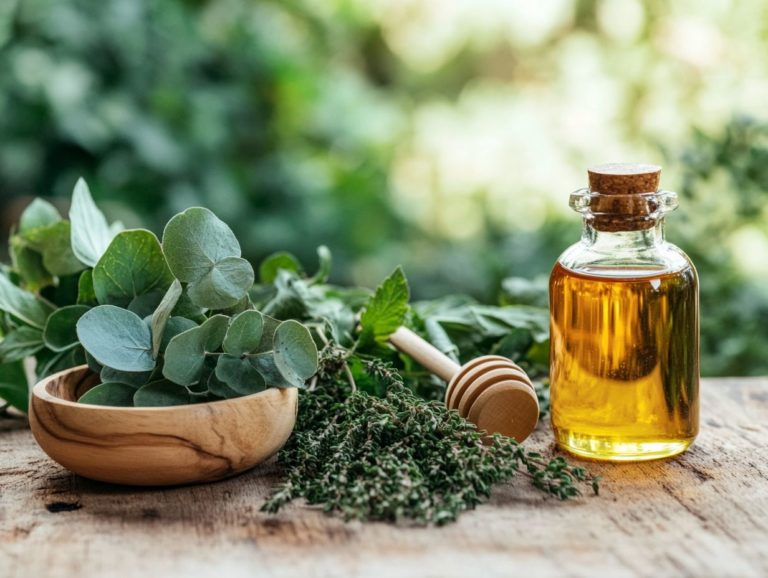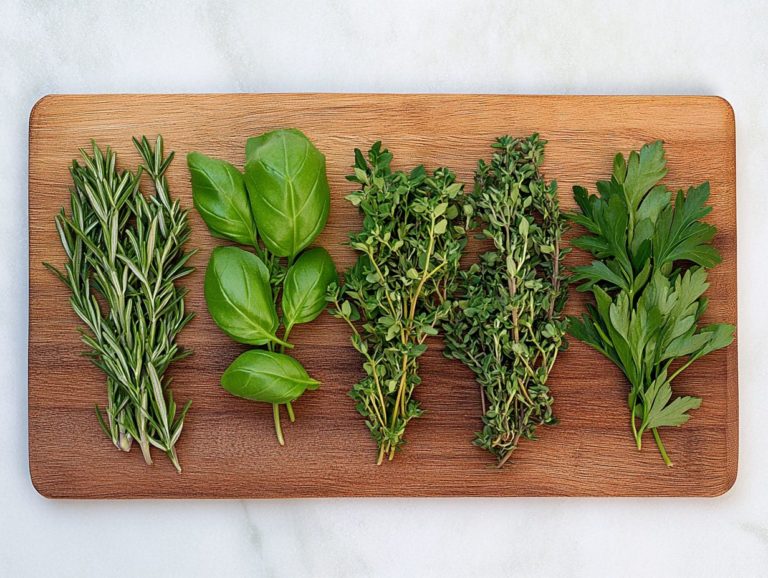The Role of Fennel in Herbal Remedies
Fennel, a versatile herb with a distinct flavor and aroma, has been treasured across cultures for centuries.
Its history is rich, woven with traditional uses that underscore its significance in both culinary and medicinal practices. With its antioxidant properties and ability to reduce swelling, fennel offers a wealth of advantages for those passionate about wellness.
This article delves into fennel s cultural importance, medicinal qualities, methods for creating herbal remedies, and essential precautions to keep in mind. Discover how this remarkable herb can elevate your health and culinary endeavors.
Contents
Key Takeaways:
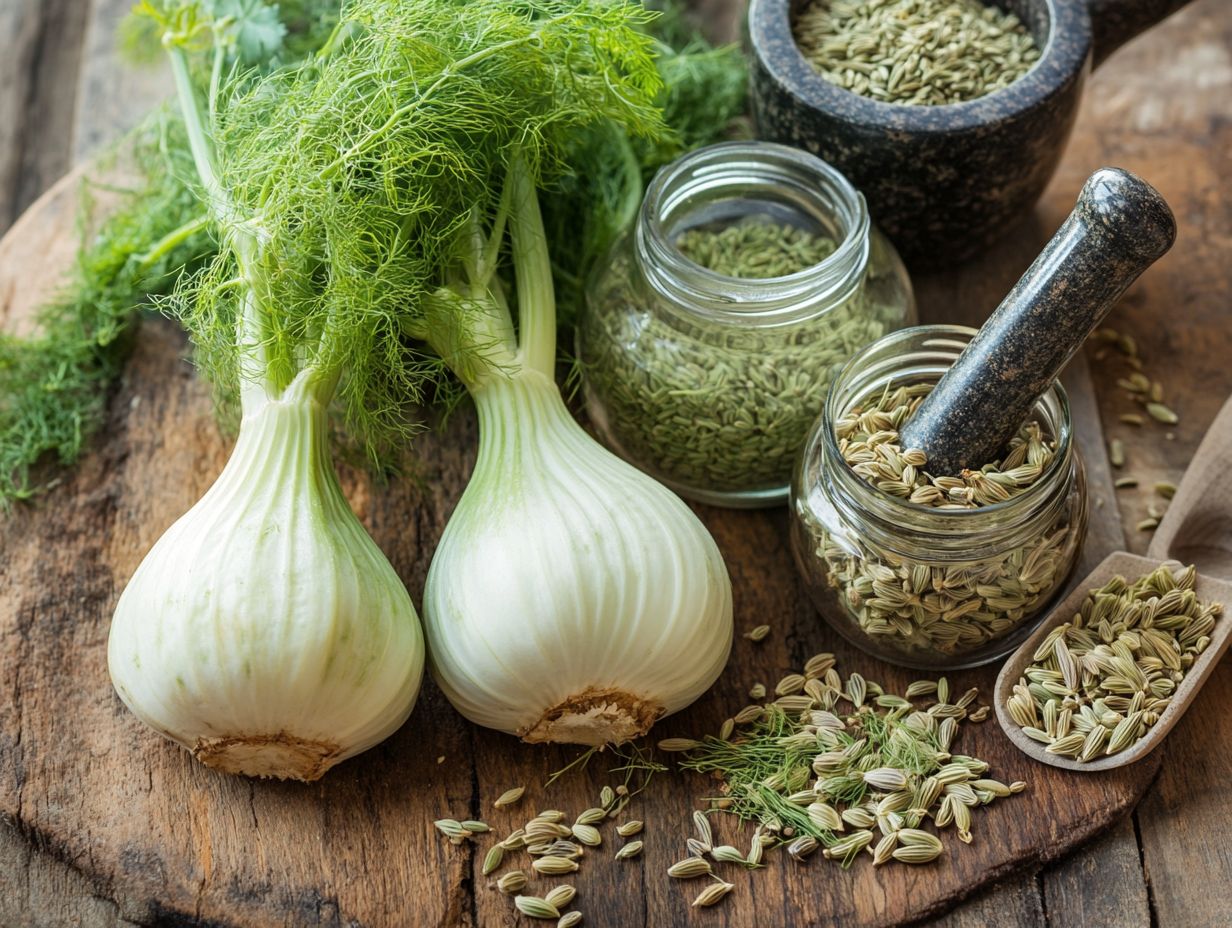
- Fennel has a long history of traditional use in various cultures for its medicinal properties.
- With its antioxidant effects, fennel is believed to have potential health benefits that may aid in improving overall well-being.
- When used appropriately, fennel can be beneficial in herbal remedies. However, it is important to be aware of possible side effects and interactions.
What is Fennel?
Fennel, or Foeniculum vulgare if you re feeling scientific, is an aromatic plant from the Mediterranean, celebrated for its versatility as both a culinary herb and a traditional medicinal powerhouse. You ll appreciate this nutrient-rich herb not only for its unique flavor that enhances your dishes but also for its impressive health benefits, including assisting digestion and even potential anticancer effects.
Its feathery leaves and bulbous base bring texture to your meals while imparting a subtle, sweet anise flavor that beautifully complements salads, soups, and roasted vegetables. This herb has been prized since ancient times for its medicinal properties, believed to enhance digestive health and support the immune system.
In your kitchen, you can slice and caramelize the tender bulb or grind its seeds into spice blends or steep them into a delightful tea. Make sure to grab fennel essential oil, extracted from its seeds; it offers therapeutic benefits, including anti-inflammatory and antioxidant properties, making this herb an essential part of your health toolkit.
History and Cultural Significance
Fennel has an exciting history that dates back to ancient civilizations, revered not just for its culinary delights but also for its impressive medicinal properties. Roman scholar Pliny documented its various applications in traditional medicine during the Middle Ages, highlighting its significance in herbal practices.
Even Charlemagne recognized fennel as a valuable herb, further cementing its esteemed status throughout history.
Traditional Uses of Fennel
Fennel has long been celebrated in traditional medicine as a potent herbal remedy for various ailments, especially for providing relief related to digestion and alleviating colic. Its therapeutic versatility spans across numerous cultures, making it a cherished staple.
Historically, the seeds of this aromatic plant have gained a reputation for their ability to soothe an upset stomach, ease bloating, and reduce inflammation within the digestive tract. Ancient civilizations, including the Greeks and Romans, recognized fennel s remarkable efficacy in treating digestive disturbances, utilizing it to calm both colicky infants and adults alike.
Its anti-inflammatory properties further enhance its appeal, establishing fennel as a natural remedy that not only supports digestion but also promotes overall well-being. This remarkable herbal ally has, therefore, secured a distinguished place in the realm of traditional herbal medicine, revered for its capacity to harmonize and balance bodily functions.
Medicinal Properties of Fennel
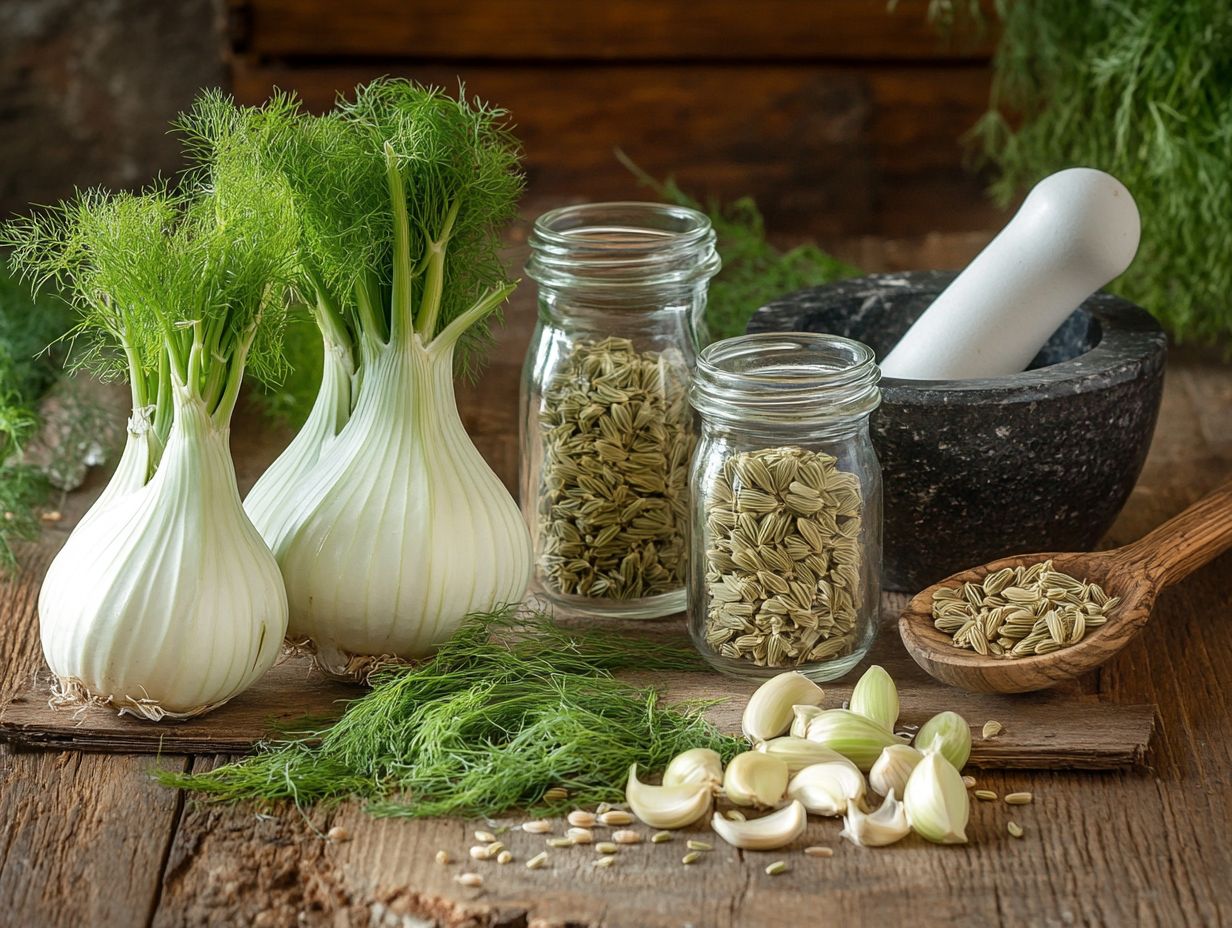
Fennel is celebrated for its remarkable medicinal properties, presenting a wealth of health benefits thanks to its rich blend of antioxidants, vitamin C, and anti-inflammatory compounds.
Incorporating fennel into your diet not only enhances your meals but also elevates your health, making it an invaluable asset in both natural nutrition and traditional medicinal practices.
Antioxidant and Anti-inflammatory Effects
The antioxidant and anti-inflammatory properties of fennel are among its most renowned health benefits. These qualities solidify its status as a powerful herbal remedy for alleviating stomach inflammation and enhancing your overall wellness.
Research reveals that fennel contains specific plant compounds, such as flavonoids and phenolic acids. These compounds are pivotal in neutralizing free radicals, which are harmful molecules that can damage cells, and minimizing oxidative stress. They actively work to reduce inflammation at a cellular level, making fennel particularly advantageous for anyone grappling with digestive disorders.
Clinical studies suggest that regular consumption of fennel can lead to significant improvements in symptoms linked to stomach inflammation. This reinforces its claims of health benefits. Such findings highlight the merit of incorporating fennel into a balanced diet to promote not only digestive health but also your overall well-being.
Other Potential Health Benefits
Beyond its impressive antioxidant and anti-inflammatory effects, fennel offers a range of potential health benefits that you might find intriguing. It serves as an appetite suppressant, a digestive aid, and even provides supportive properties during breastfeeding.
Moreover, its anti-diabetic effects are significant. This aromatic herb has woven itself into the fabric of various cultures as a natural remedy. Anecdotal evidence suggests it can ease digestive discomfort and bloating.
Many people discover that fennel seeds effectively curb cravings, making them a valuable ally in maintaining a healthy weight. For breastfeeding mothers, fennel is often praised for its lactogenic properties, which may enhance milk production and soothe colicky infants.
Its anti-diabetic attributes further enhance its appeal. It aids in regulating blood sugar levels for those managing diabetes. Fennel blends rich history with amazing health benefits that everyone should explore!
Using Fennel in Herbal Remedies
Incorporating fennel into herbal remedies offers you a range of preparation methods and dosage recommendations. This allows you to easily access its therapeutic properties and health benefits.
Whether you choose to use it in your culinary creations or delve into traditional medicine, fennel presents a versatile option for enhancing your well-being.
Methods of Preparation and Dosage
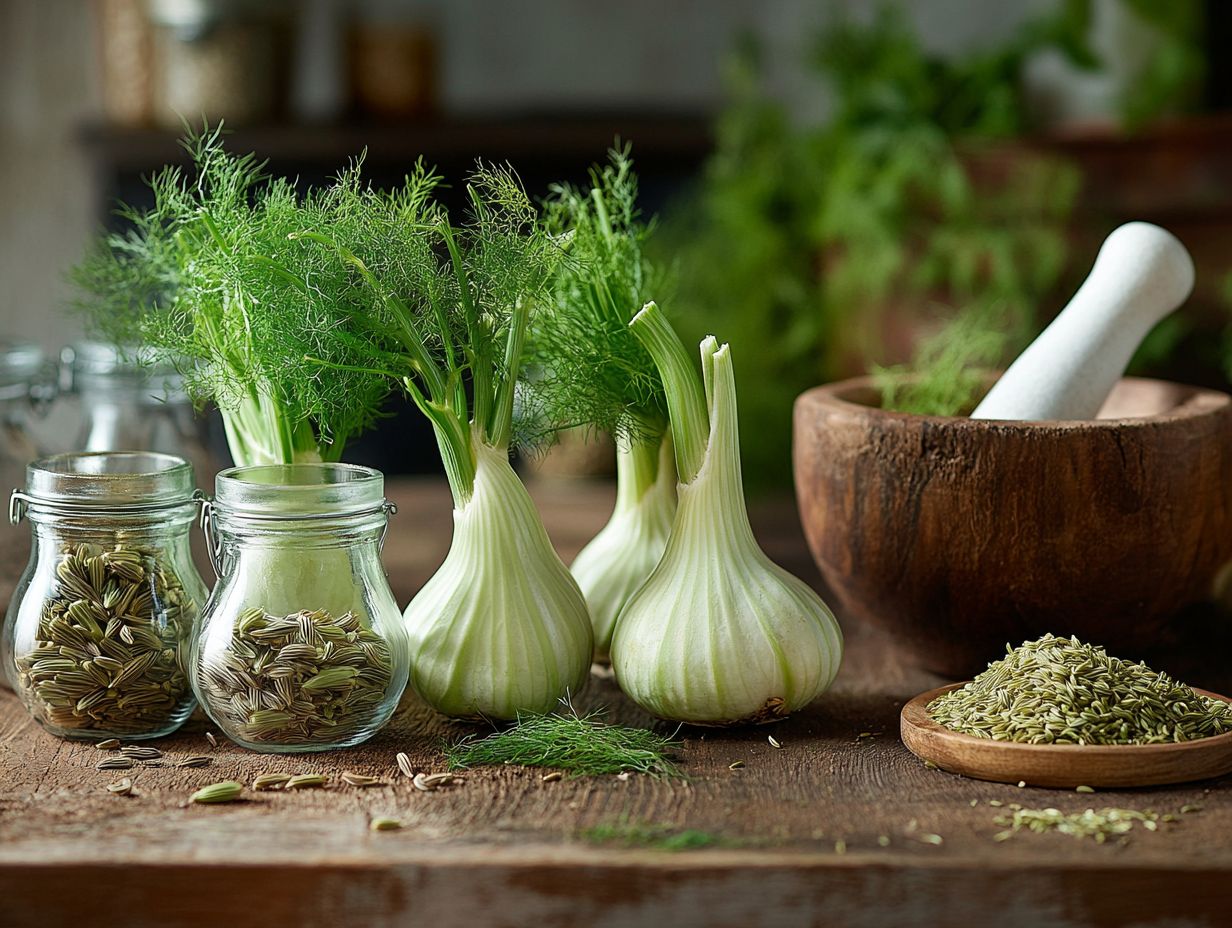
Fennel is a versatile gem that you can use in various forms, such as herbal extracts, essential oils, and culinary delights. Each form requires specific preparation methods and dosage recommendations to ensure both safety and efficacy.
If you’re interested in crafting herbal extracts, soak crushed fennel seeds in alcohol to extract the beneficial compounds. A typical ratio for this process is 1:5 (herb to solvent). After several weeks of steeping, strain the mixture and store it in a dark glass bottle to preserve its potency.
For essential oils, employ steam distillation of the fennel plant. This captures those aromatic properties while keeping their strength intact. When considering dosage, follow established guidelines generally, you can take 1-2 teaspoons of the extract daily. Essential oils should be used sparingly, ideally diluted in a carrier oil.
Always consult a healthcare professional before using fennel in larger amounts, especially if you are pregnant, nursing, or on medication, as interactions may arise. Taking these precautions ensures that you enjoy the benefits of fennel safely and effectively.
Possible Side Effects and Interactions
While fennel is often lauded for its numerous health benefits, it s crucial to be aware of potential side effects and interactions, along with safety concerns tied to its consumption, especially for specific populations.
Don’t miss out on incorporating fennel into your health routine today! Explore the power of fennel and unlock its full potential for your health!
Precautions and Warnings
When considering the use of fennel, particularly in herbal remedies or dietary supplements, it is essential to pay close attention to specific precautions and warnings. This is especially true regarding its potential harm to a developing baby and effects during lactation.
Fennel is often loved for its culinary and medicinal benefits. However, it can pose risks for certain individuals, particularly those who are pregnant or breastfeeding. Research shows that some compounds in fennel may interfere with normal developmental processes. This raises concerns about their potential harm to a fetus.
If you are nursing, be cautious. Active compounds can transfer into breast milk and possibly affect your infant.
Always check with your healthcare provider before adding fennel to your diet. This ensures you make safe choices for both you and your baby.
Summary of the Benefits and Risks of Fennel
Fennel offers a wealth of health benefits. From its impressive antioxidant properties to its rich history as an herbal remedy, it is essential to remain mindful of the potential risks and side effects that may accompany its consumption.
This remarkable plant has been celebrated across various cultures, not just for its delightful flavor but also for its therapeutic properties. These include enhancing digestion and reducing inflammation.
Traditionally, fennel seeds have served as a natural digestive aid. They help to alleviate bloating and gas.
Fennel is packed with essential nutrients. It may support heart health and hormonal balance. However, it is vital to approach its use with caution.
Overindulgence can lead to unwanted effects, especially for those with specific allergies or hormonal sensitivities. Remember, moderation is key! Enjoy the benefits of fennel without risking any side effects.
Frequently Asked Questions
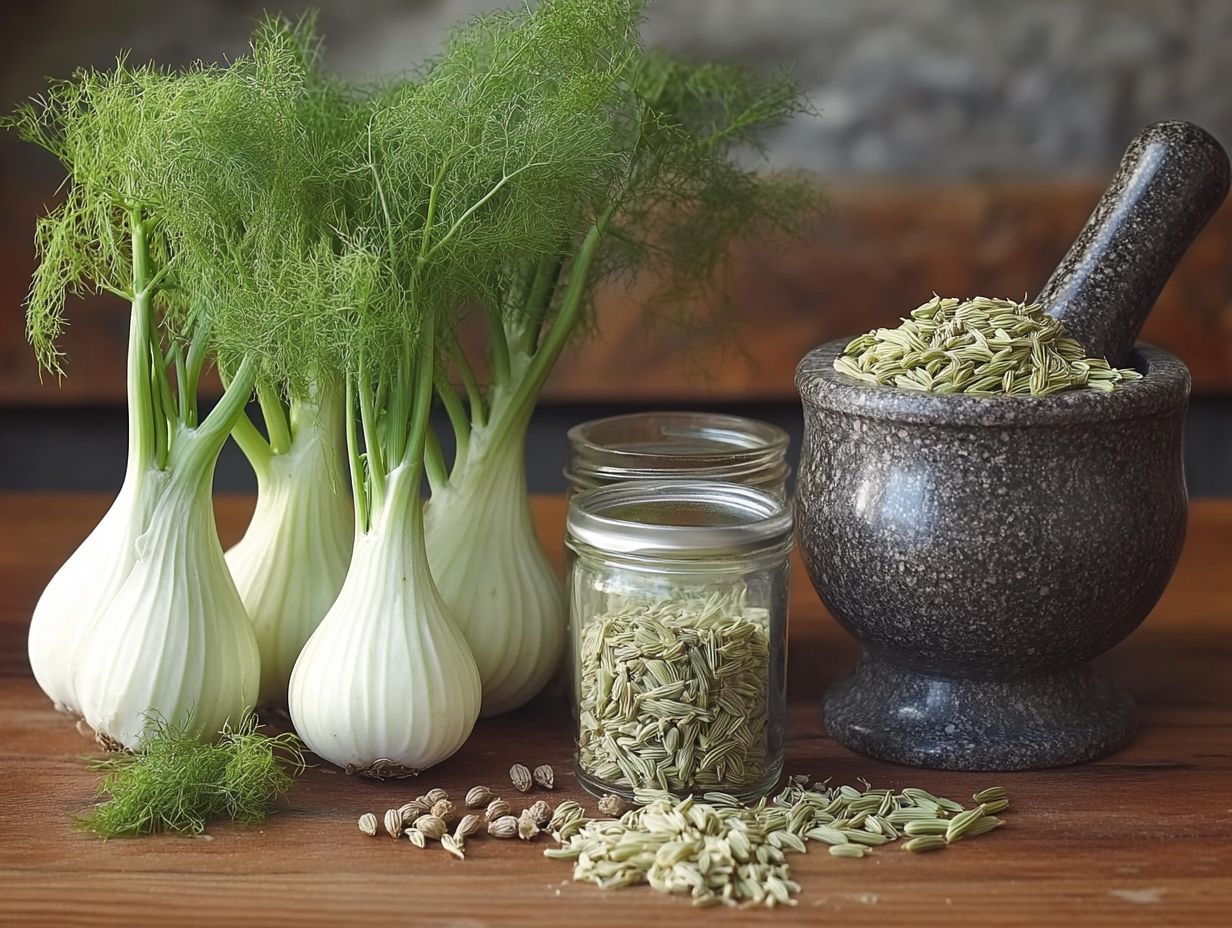
What is the role of fennel in herbal remedies?
Fennel is a medicinal herb that has been used for centuries in various herbal remedies due to its numerous health benefits.
What conditions can fennel be used to treat?
Fennel has traditionally been used to treat digestive issues such as bloating, gas, and stomach cramps. It has also been used to boost lactation in nursing mothers and to alleviate menstrual symptoms.
How does fennel work in the body to provide health benefits?
Fennel contains anethole, an organic compound that helps relieve muscle spasms. It also contains antioxidants that can help protect cells from damage and improve overall health.
Is fennel safe to use in herbal remedies?
Yes, fennel is generally considered safe when used in recommended doses. However, it is always best to consult with a healthcare professional before using any herbal remedy.
Can fennel be used for skin care?
Fennel contains vitamin C and antioxidants that can help improve skin health. It can be used topically to reduce inflammation and improve skin tone.
Are there any potential side effects of using fennel in herbal remedies?
In some individuals, fennel can cause allergic reactions or interact with certain medications. It is important to speak with a healthcare professional before using fennel in herbal remedies, especially if you have any underlying health conditions.

